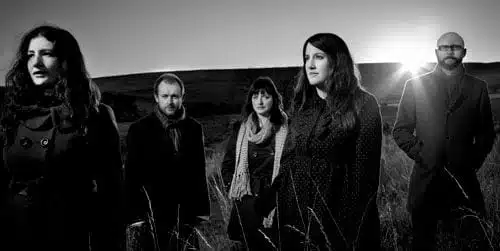
Folk music continually reminds us that time moved slower back then. That may not sound like a great revelation, but listening to such music can force us to re-experience this sensation of finely measured moments. This is certainly the case with the latest release by the British band the Unthanks. The songs linger and progress incrementally. The unhurried pace has an underlying purpose. The album’s thematic conceit is that we are experiencing the Last Days. There’s no reason to look ahead and every reason to reflect on the present and treasure the past.
If that seems a bit dire and maybe even somewhat of a bummer, don’t be alarmed. The music emerges from a long folk tradition that treats the present in this fashion. This makes one value the here and now and why the vocals and instrumentation can be so dramatic. Just consider as two sisters, Rachel and Becky Unthank, harmonize on lines such as, “Here today / gone tomorrow” while declaring their love for a suitor over all family and friends on “The Queen of Hearts”. It’s not like it was centuries ago when people really had to leave friends and family when they immigrated to another country across the ocean. We live in an age of cell phones, the internet, and commercial aviation. But seeing life from this perspective, that’s timeless — a love so strong, one would give up all ties to an existing life for that person.
The Unthank sisters’ voices form the musical core of the album. Whether they are singing together or as soloists, the vocals are richly sung with deep emotion. They construct a pretty artifice, whether they are decrying the horrors of coal mining, as in the band’s cover of Alex Glasgow’s “Close the Coal House Door”, or lamenting the Iraq war as in Jon Redfern‘s “Give Away Your Heart”. At one point in the latter tune, the singers mournfully repeat the refrain “Disappointment is everywhere” five times alongside a forlorn piano over one minute and 15 seconds. The effect is devastatingly beautiful.
Adrian McNally serves as the group’s manager and its pianist, producer and arranger. He’s also Rachel’s husband. McNally marvelously keeps the production large and full of empty spaces. The are plenty of a capella moments and the sounds of a solo instruments. The creates an intimate atmosphere. One can hear every word.
The curious thing is: the singers sometimes seem to create their own language — one based in English, but it seems a bit Celtic and or Welsh — but really, while one has to presume the songs are traditional, I sometimes suspect that they just may be playful nonsense. I have no idea what the cryptic “Gan to the Kye” or the playful “My Laddie Sits Ower Late Up” and “Canny Hobby Elliott” are about, but the first one sounds romantic as all get go, and the latter two are joyfully upbeat songs.
When the lyrics are more direct and in contemporary language, such as on the title track, the meaning comes across strongly. “We are last / Time will pass / And soon we’ll know,” the sisters sing over a lilting melody, only to continue later that “We won’t last / We will pass.” But then the song segues into a new narrative about lonely people in an apartment building. Lovely people. But they never meet. They move on, alone. What could be sadder? Associations between the words “lost” and “last” — sometimes it seems that the sisters are singing one word instead of the other.
The covers — of Tom Waits’ “No One Knows I’m Gone” and King Crimson’s “Starless” — are just as bleak in attitude but still uplifting in their woe. The formal beauty of the presentations, thanks to McNally’s arrangements, offers a profound appreciation of the sorrow. The album ends with an instrumental coda of “Last.” Yep, we will all come to an end. And, by implication, so will the world someday. It was nice while it lasted.

